Fourth Month, Fifth Day, 2007
Dear friends and family,
I know that it has only been a week since I last wrote, but last night, in conversation with a dear friend, I had an insight and wrote a note to myself about identity. I am tall, white, from the United States, Christian, and male; and all of this leads to hostility at times. So I want to explain how I live with these identities, especially in Bolivia.
I am called a gringo (whitey) almost daily. I think I have some sense of what it feels like to be a minority in the United States and to be singled out for my skin color alone. I know that I do not experience the oppression of centuries that minorities in the U.S. do (and have), which makes me balk because constantly being asked where I’m from really is something for which I am not prepared.
That said, I have begun to realize that I do need to claim my white U.S. identity, and to claim (and not deny) the privilege that comes with that identity. I claim my male identity knowing that men have committed atrocities against women and against other men, and denying that identity will not end injustice. It seems that the only way to make things
better is to claim that identity and try to live a life in accordance with my principles even when they conflict with those of many other men, whites, Christians, and U.S. citizens. In other words, I must try to change things from the inside.
So, what does that mean? For me it means saying yes, I am a Christian, and this is what my Christianity looks like. I do not feel the need to Christianize the world—I have an understanding that God speaks to everyone individually and we are all doing the best we can to follow that still small voice. My faith follows the life of Jesus more than the words of the Bible; it follows the idea that love is the first motion, as John Woolman put it. I try to live a life that shows love and caring rather than judgment and ire. I feel as though that is my Christianity, and in so living it I offer a different vision of what a Christian might be than many have. I do not take pride in the many deaths that have happened in the name of Christianity, but I do recognize that they are part of my past.
In being a U.S. citizen traveling in Bolivia I need to say yes, I am a gringo; yes, my country’s president is George W. Bush; yes, it is my compatriots that are currently in Iraq; no, I do not agree with my country’s current administration; and I do not agree with most of our mainstream politics. But we are a country of democracy (at least that is what we are told to believe), and the majority of U.S. voters did put Bush in power.
More than the politics, I need to say "Sí, soy estadounidense" (yes I am from the U.S.); I need to say yes, I know your language; yes, I have some idea of your history; no, I have not gone traveling to Lake Titicaca; and no, I am not here as a tourist. Yes, I have a community here; yes, I am still very ignorant and hoping to learn more. No, I did not come to Bolivia to drink in your culture and leave. I came to live with you, to learn with you, to share some skills and information that I have and to thank you for sharing that which you have. I know my country is not doing well by yours at this moment, but only through our shared conversations, and our building of this community across the borders, will things change. Then I will be able to help my communities in the U.S. understand a little more of another life.
This is how I try to work daily, and to find grace in moments of anger—when another child of God has chosen to show his distaste for people of my skin color by spitting on me. In those moments I try to ground myself in my principles; I want to say, if only you knew me, if you knew that I was at this very moment walking to work with your children, you would not despise me. In those moments I remember why I am here, and how necessary it is to offer a different perspective of what a tall white man might be doing in Bolivia, both to my people in the U.S. and to the people I come in contact with in Bolivia.
I find myself thinking of those people around the world trying to walk in this grace, of those in the U.S. who are forced to do so, and of those around the world who have found different ways to expose and denounce these generalizations and mindsets that are so often based in hate and fear. Our world is hurting and there is much to be done, yet all we can do is live our lives the best we can. That is my project, it hurts often, and I feel useless at times, but the more I can step out of those places and have faith, the better my life goes.
That is it for now. Thank you for sharing in this journey with me.
Faithfully,
Andrew


